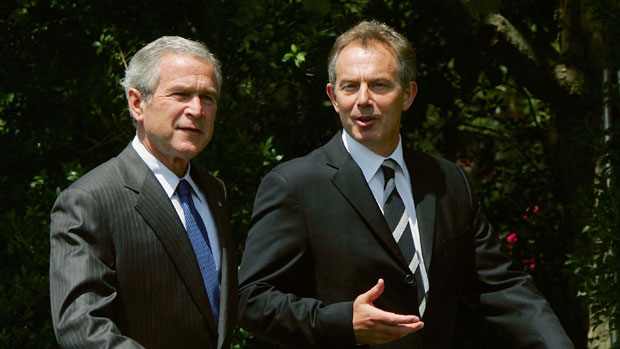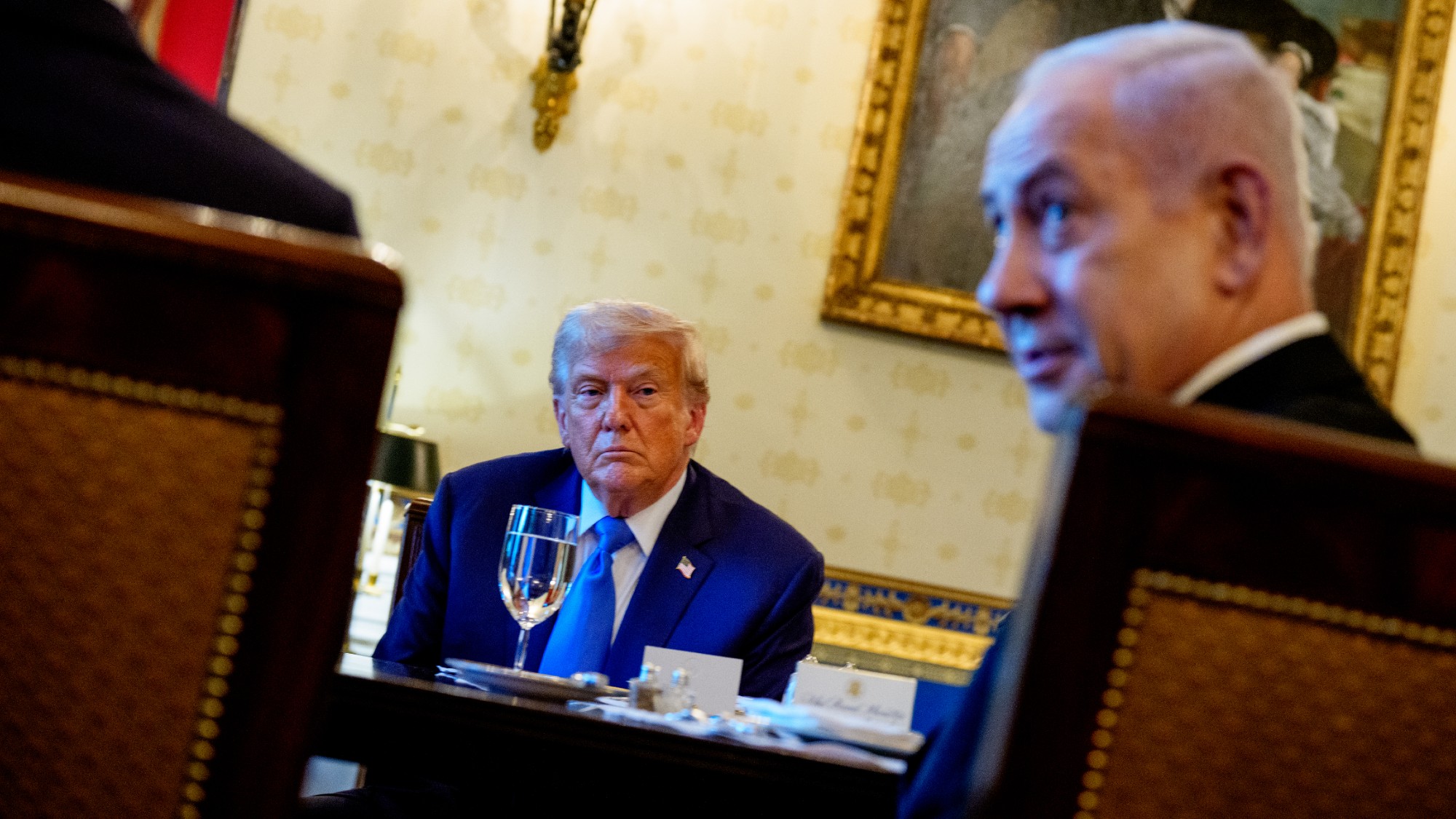Chilcot Inquiry: why Blair-Bush messages will be censored
Inquiry into Britain's role in Iraq War is condemned as a 'whitewash' as private messages suppressed

A free daily email with the biggest news stories of the day – and the best features from TheWeek.com
You are now subscribed
Your newsletter sign-up was successful
The Chilcot Inquiry into Britain's role in the Iraq War has been branded a "whitewash" after crucial messages from Tony Blair to George W Bush were suppressed.
The inquiry, named after its chairman Sir John Chilcot, was set up five years ago in part to examine why Blair decided the UK should go to war. But Cabinet Secretary Sir Jeremy Heywood has vetoed the release of more than 150 letters and phone calls from Blair to Bush in the run-up to the 2003 conflict. Critics claim the British public will now never know the real truth about the war...
What will be censored?The inquiry committee has spent years wrangling with Whitehall about what it can and cannot include when it finally publishes its report, possibly within the next year. It has now agreed that it will not publish 25 letters sent from Blair to Bush, nor the transcripts of 130 phone calls between the two men in the lead-up to the war. According to the Daily Mail, the messages show Blair telling the US President: "You know, George, whatever you decide to do, I'm with you." The US president's replies or any material that reflects his views will not be published in any form.
The Week
Escape your echo chamber. Get the facts behind the news, plus analysis from multiple perspectives.

Sign up for The Week's Free Newsletters
From our morning news briefing to a weekly Good News Newsletter, get the best of The Week delivered directly to your inbox.
From our morning news briefing to a weekly Good News Newsletter, get the best of The Week delivered directly to your inbox.
What will be published?As a compromise, Chilcot has said the long-awaited report will publish only "the gist" of Blair's messages. He hopes to include some quotes but will have to negotiate with Heywood about the precise wording. The details of over 200 Cabinet-level discussions on the Iraq War will, however, be made available for publication or reference by the inquiry. Overall, the inquiry aims to provide a "reliable account of events" that will identify lessons for future governments making decisions about potential conflicts. The inquiry covers the period from 2001 up to the end of July 2009.
Why has the Chilcot Inquiry been censored?The official reason for the censorship is that publication would deter future prime ministers from speaking freely with world leaders in private. Blair, who is expected to face heavy criticism in the report, has always denied trying to block the release of the messages. US authorities explicitly ordered Britain not to publish confidential conversations involving the former president, The Independent revealed last year.
Why does it matter?Critics are furious as they say the truth about the Iraq War is being concealed. Former Labour MP Andrew MacKinlay described it as "a bad, bad day for democracy and justice". He claims the country has been lied to "time and time again" about Iraq and says the lies will now "endure". Labour MP John McDonnell said the move by Heywood "confirms all the suspicions people had that the inquiry will be a whitewash". He added: "Unless there's full and open transparency, the credibility of this inquiry will be completely undermined." Meanwhile, families of some of the 179 British soldiers killed in the conflict, who had hoped the correspondence would reveal the real reason Blair took the country to war, have said they feel betrayed by the decision. Reg Keys, whose son Lance Corporal Tom Keys was killed at the age of 21 in 2003, told BBC 2's Newsnight programme: "I need to draw a line under this and until I know the whole truth I can't. It will be an open wound until the day I die."
When will the Chilcot Inquiry be published?The date of publication is yet to be agreed. Legal letters will be sent to certain witnesses, including Blair and his spin chief Alastair Campbell, asking them to respond to criticism in the draft report – a process expected to take several more months. The report will then be sent to Prime Minister David Cameron, who will decide if it should be published in the run-up to next May's general election. Cameron has previously suggested that he wants the report to be published by the end of this year.
A free daily email with the biggest news stories of the day – and the best features from TheWeek.com
-
 Local elections 2026: where are they and who is expected to win?
Local elections 2026: where are they and who is expected to win?The Explainer Labour is braced for heavy losses and U-turn on postponing some council elections hasn’t helped the party’s prospects
-
 6 of the world’s most accessible destinations
6 of the world’s most accessible destinationsThe Week Recommends Experience all of Berlin, Singapore and Sydney
-
 How the FCC’s ‘equal time’ rule works
How the FCC’s ‘equal time’ rule worksIn the Spotlight The law is at the heart of the Colbert-CBS conflict
-
 Local elections 2026: where are they and who is expected to win?
Local elections 2026: where are they and who is expected to win?The Explainer Labour is braced for heavy losses and U-turn on postponing some council elections hasn’t helped the party’s prospects
-
 How corrupt is the UK?
How corrupt is the UK?The Explainer Decline in standards ‘risks becoming a defining feature of our political culture’ as Britain falls to lowest ever score on global index
-
 Reforming the House of Lords
Reforming the House of LordsThe Explainer Keir Starmer’s government regards reform of the House of Lords as ‘long overdue and essential’
-
 The Board of Peace: Donald Trump’s ‘alternative to the UN’
The Board of Peace: Donald Trump’s ‘alternative to the UN’The Explainer Body set up to oversee reconstruction of Gaza could have broader mandate to mediate other conflicts and create a ‘US-dominated alternative to the UN’
-
 The high street: Britain’s next political battleground?
The high street: Britain’s next political battleground?In the Spotlight Mass closure of shops and influx of organised crime are fuelling voter anger, and offer an opening for Reform UK
-
 Is a Reform-Tory pact becoming more likely?
Is a Reform-Tory pact becoming more likely?Today’s Big Question Nigel Farage’s party is ahead in the polls but still falls well short of a Commons majority, while Conservatives are still losing MPs to Reform
-
 Taking the low road: why the SNP is still standing strong
Taking the low road: why the SNP is still standing strongTalking Point Party is on track for a fifth consecutive victory in May’s Holyrood election, despite controversies and plummeting support
-
 Gaza peace deal: why did Trump succeed where Biden failed?
Gaza peace deal: why did Trump succeed where Biden failed?Today's Big Question As the first stage of a ceasefire begins, Trump’s unique ‘just-get-it-done’ attitude may have proven pivotal to negotiations